- Government
- Posted
Over Eur1 million per week insulation grants paid by SEAI
 Over Eur1 million per week in energy retrofit grants are currently being paid out by the Sustainable Energy Authority of Ireland (SEAI), a government official has said.
Over Eur1 million per week in energy retrofit grants are currently being paid out by the Sustainable Energy Authority of Ireland (SEAI), a government official has said.
 Over Eur1 million per week in energy retrofit grants are currently being paid out by the Sustainable Energy Authority of Ireland (SEAI), a government official has said.
Over Eur1 million per week in energy retrofit grants are currently being paid out by the Sustainable Energy Authority of Ireland (SEAI), a government official has said.
Speaking at a Tipperary Institute’s sustainable energy conference, Department of Energy official Stjohn O’Connor said: “SEAI is providing grant aid of Eur1m per week under the Home Energy Saving scheme at present.” O’Connor was presenting outlines of the national retrofitting programme which is expected to be put in place by January 2011. “Making our existing and new buildings sustainable is a national challenge,” he said.
“Over a million houses are going to have to have energy upgrades completed. Completing these upgrades will save Eur17 billion more than it costs. We need to find innovative financial mechanism to meet the upgrading challenge.”
Nearly 100 people including leading experts and policy makers from the construction sector met to discuss the challenge of reducing energy consumption in Irish buildings at the Tipperary Institute event, Retrofitting and New Build in the New Environment, on Friday 23April. The event was organised as part of the multi million euro EU Sustainable Energy in Rural Village Environments (Serve) project which Tipperary Institute is coordinating.
Many of the technical aspects related to sustainable building were addressed during the day. Serve project coordinator Seamus Hoyne provided an outline of what is being achieved: “The Serve project has already supported upgrades to nearly 200 buildings and assisted the development of the eco-village in Cloughjordan,” he said. “We have also invested in the wood chip powered district heating system in the eco-village and also aim to have two other similar systems installed by early next year. North Tipperary is becoming a show case of what can be done but there is more to be done across all aspects of society.”
Key issues of how to address insulation upgrades within existing buildings, managing ventilation and healthy buildings and technical challenges to improving heat systems were considered. A common theme highlighted and discussed was the need for more training and education of homeowners, engineers, architects and others involved in the sector. Opening the conference, Tipperary Institute chief executive Michael O’Connell announced that TI has recently got approval from the Higher Education and Training Awards Council (Hetac) to run a bachelor of sciences computing course on smart sustainable energy technologies. “Tipperary Institute is delighted that this new programme, which combined our expertise in computing with our expertise in the sustainable energy sector, is being approved and we see it as providing excellent graduates who can work in the sustainable energy sector in the future,” he said.
Looking to the buildings of the future Sarah Neary of the Department of Environment’s building standards section emphasised that fact that by 2013 building regulations will demand low carbon or zero carbon homes. Examples of how this could be achieved through the use of district/community heating systems and innovative design systems were examined, and sustainable design consultant Patrick Daly provided details of his recently completed energy plus house in Mullingar.
Prior to the conference delegates had the opportunity to visit houses in Nenagh which had been upgraded under the Serve project and the eco-village in Cloughjordan. These practical site visits allowed people to touch, see and feel what a sustainable building means and discussions groups were used to gather reaction and responses from people at the end of the day.
One of the participants at the event commented “this event has helped to lift some of the pessimism I have been experiencing for the past year. It is clear that there are people and organisations like Tipperary Institute who are trying to make a difference and this event demonstrated that. The range of speakers was second to none, the site visits highly informative and the discussion groups extremely beneficial in being able to voice concerns and issues in the sustainable building sector. Hopefully Tipperary Institute can continue to influence change and help develop a construction sector which is sustainable in every way into the future.”
Further information and copies of presentations for the event, which was sponsored by CareyGlass Solar and Joinery from Nenagh and supported by SEAI, are available at www.servecommunity.ie.
The Serve project demonstrates sustainable energy use in rural communities. Energy upgrade work is led by the North Tipperary County Council and new build by the not-for-profit Cloughjordan eco-village, Sustainable Projects Ireland Ltd.
The project has secured Eur4.1m in grant aid from the EU Concerto programme to complete energy efficiency upgrades on 500 buildings between 2008 and 2010. The funding includes supporting the development of the eco-village in Cloghjordan through the installation of a renewable energy district heating system using biomass and solar. It will result in 400 renewable energy heating systems being installed in the region, and will pay towards promotion, education and training in the region.
The Serve consortium teams local actors with EU experts, to facilitate technology transfer and ensure best practice. Serve may be the first such program targeted at rural areas, and could be widely replicable across the EU.
An integrated education and development institute established by the Irish government, Tipperary Institute runs certificate and degree courses in sustainable rural development, renewable energy, business, social studies, environmental management, creative multimedia and computing.

